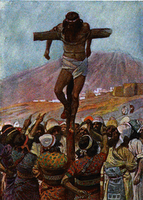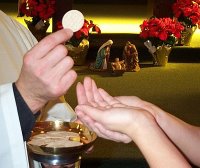While there’s certainly plenty of blame to go around, we who claim to be Christian cannot accuse others without at least partially accusing ourselves. After all, don’t we already know about “the true meaning of Christmas”? Most of us can tell the story, many able to recite it word-for-word from our old King James Bibles.
Unfortunately, knowing the true meaning of Christmas doesn’t guarantee our celebrating a truly meaningful Christmas. In all of life, Christians too often experience disconnects between what we know and what we do. So it is with the Feast of the Nativity. We remember the angel’s words, “Unto you is born this day in the city of David a Savior, who is Christ the Lord. (Luke 2:11)” Then we forget why we need this Savior.
The Christmas hymn Hark the Glad Sound first announces His coming, then invites our response: “Let every heart prepare a throne And every voice a song.” The next stanzas tell how He brought salvation from “Satan’s bondage” and our own sinful actions. They sing of Christ rescuing mankind from the effects of sin, including mental defect and illness, blindness, fiscal and spiritual poverty, heartbreak, and the like. We know that in time, we receive these only in part; however, we are certain that we’ll enjoy them fully in the Resurrection.
The true meaning of Christmas certainly includes the fullness of Jesus’ life, work, suffering, death, and resurrection. “Christ Jesus came into the world to save sinners (1 Timothy 1:15)” and no amount of commercial or sentimental excess can change this fact. The Christ Child came not to market violent electronic games, expensive new cars, or other consumer items. Likewise, His virgin mother “laid him in a manger (Luke 2:7)” not to invite our cooing over the cute Baby but simply to give Him a place to rest His newborn, helpless body as He entered the world to which His Father sent Him as Savior.
 How could any true Christian peer into Jesus’ first bed without also seeing cross and tomb? At the beginning of His life of humble service, Mary “laid him in a manger.” After He died, Joseph of Arimathea and Nicodemus took Him to “a new tomb” in a garden and “laid Jesus there. (John 19:41-42)” The almighty Son of God began and ended His saving work unable to bed Himself. He depended upon others to lay Him to rest after He drew His first breath and once He drew His last. He willingly “made himself nothing” and “humbled himself by becoming obedient to the point of ... death on a cross. (Philippians 2:7-8)” We understand the true meaning of Christmas when we realize that everything Jesus Christ did, He did to save us from our sins.
How could any true Christian peer into Jesus’ first bed without also seeing cross and tomb? At the beginning of His life of humble service, Mary “laid him in a manger.” After He died, Joseph of Arimathea and Nicodemus took Him to “a new tomb” in a garden and “laid Jesus there. (John 19:41-42)” The almighty Son of God began and ended His saving work unable to bed Himself. He depended upon others to lay Him to rest after He drew His first breath and once He drew His last. He willingly “made himself nothing” and “humbled himself by becoming obedient to the point of ... death on a cross. (Philippians 2:7-8)” We understand the true meaning of Christmas when we realize that everything Jesus Christ did, He did to save us from our sins.Unfortunately, we often get stuck between knowing the true meaning of Christmas and converting that knowledge into a Christmas that’s truly meaningful. When we become caught up in buying and exchanging gifts, we forget that true gifts aren’t exchanged — they’re given. Indeed, if you expect something of equal value in return, how can it be a gift? We can get tired and frustrated when we desire to focus on the holiday’s central meaning while still going along with so many of the world’s distractions. In this, we don’t differ from Saint Paul, who lamented, “I do not do the good I want, but the evil I do not want is what I keep on doing. (Romans 7:19)”
In A Christmas Carol, Ebenezer Scrooge was terrified into changing his outlook and actions. Dickens commented on the miser’s conversion: “It was always said of him, that he knew how to keep Christmas well, if any man alive possessed the knowledge.” He then expressed the wish, “May that be truly said of us, and all of us!” Dickens may have gotten some of the actions right — “Love is the fulfilling of the Law (Romans 13:10)” — yet nowhere recognizes that permanent change comes not from within but without. Scrooge’s change was wrought by fear, and fear is a tool of God’s Law.
If we were able to keep the Law, we’d have no need for our Savior. However, we can no more truly and fully “keep Christmas well” than can we “listen to the voice of the Lord ... do that which is right in his eyes, and give ear to his commandments and keep all his statutes. (Exodus 15:26)” Christ kept the Law perfectly, fulfilling its demands of which we were incapable. We can’t make ourselves into “better” Christians any more than we can make ourselves into Christians in the first place. The ability and the glory belong to “God who works in you, both to will and to work for his good pleasure. (Philippians 2:13)”
Likewise, keeping Christmas cannot happen because we hate our own actions or despise the world’s greed. Christ’s birthday celebration holds deeper meaning as we quit trying to “keep” or to “do” or to “change” and instead are kept by Him, changed by Him, and have His good done to us. Having a meaningful Christmas doesn’t necessarily mean singing in the Church choir, preaching the festive sermon, or placing a larger than usual offering in the plate — although each of these can be wonderful ways of celebrating the holiday’s meaning.
Christmas becomes meaningful when we quit trying to bend it into our own shapes and instead let it shape us. Instead of a time of demanding that God do what we desire, we ask Him to work His desires upon us. Having a meaningful Christmas means having the knowledge that nothing we can give God could ever match His Gift to us — all the while seeking new ways to offer our thanksgivings by offering ourselves to Him in thought, word, and deed.
A meaningful Christmas won’t be found in malls or online shopping sites. It will not come in a dream delivered by ghosts. Watching A Christmas Story, How the Grinch Stole Christmas, or A Charlie Brown Christmas aren’t the right answers, either — although Linus’ recitation of the Christmas Gospel to Charlie Brown (see video below) points us in the right direction. Not even at home, gathering around decorated tree or blazing fire, do we usually find a completely meaningful Christmas.
 A meaningful Christmas comes when we recognize that God gives us every good gift, including meaningful lives. It comes from the pure preaching of the Gospel Word and the proper use of the sacraments. It comes where and when it pleases the Holy Spirit — and the Spirit is quite pleased to give us the goods in Christ’s Church. Meaning fades through “neglecting to meet together” in Christ’s Church rather than “encouraging one another (Hebrews 10:25)” in corporate worship.
A meaningful Christmas comes when we recognize that God gives us every good gift, including meaningful lives. It comes from the pure preaching of the Gospel Word and the proper use of the sacraments. It comes where and when it pleases the Holy Spirit — and the Spirit is quite pleased to give us the goods in Christ’s Church. Meaning fades through “neglecting to meet together” in Christ’s Church rather than “encouraging one another (Hebrews 10:25)” in corporate worship.Nothing has changed since apostolic times. Christ still intends for us to receive His gifts in corporate worship. We find a meaningful Christmas as we continue devoting ourselves “to the apostles’ teaching and the fellowship, to the breaking of bread and the prayers. (Acts 2:42)” In the gathering of the saints, Baptism saves us “by the washing of regeneration and renewal of the Holy Spirit, whom he poured out on us richly. (Titus 3:5-6)” Hearing the Gospel, “the word of the cross” applies “the power of God (1 Corinthians 1:18)” that forgives and renews us. Holy Communion feeds us on our pilgrimage, restoring and enhancing meaning through the sealing of a new covenant relationship with God “for the forgiveness of sins. (Matthew 26:28)”
A truly meaningful Christmas comes not by what we say or do. It isn’t anything we can produce or purchase. It isn’t reckoned by the number and value of presents given or received. A truly meaningful Christmas happens only when we realize that without Christmas, none of life would have meaning.
“God bless us, every one!” Bless us with faith, with meaning, and with a fervent desire to give to others the Love that came down at Christmas.
Scripture quoted from The Holy Bible, English Standard Version™, © 2001 by Crossway Bibles.
Send email to Ask the Pastor.
Walter Snyder is a Lutheran pastor, conference speaker, author of the book What Do Lutherans Believe, and writer of numerous published devotions, prayers, and sermons.
Ich interessiere mich sehr für Druck und Medien. Ich liebe es mich über neue Sachen zu informieren https://www.mohnmedia.de/druck-und-medien/
ReplyDeleteIch hab jetzt wieder mit dem Bauchtraining angefangen. Hoffentlich kann man ja im Sommer wieder an den Strand. https://www.gannikus.de/
ReplyDeleteIch habe heute das erste Mal E-Liquids bestellt. Bin total begeistert! Vor allem die von Bushido sind super. https://www.ultrabio4u.de/Mythos-by-Bushido
ReplyDeleteAt my new working place I saw an impact crusher for the first time. I think its a really cool machine. https://www.hazemag.com/en/products/horizontal-impact-crusher-hhi/
ReplyDeleteWenn man so bekannt ist, wäre es doch bestimmt eine Idee mal über einen Sicherheitsdienst nachzudenken. https://www.dussmann.ch/leistungen/sicherheitsdienst/
ReplyDeleteDen Besten Job was Möbel angeht macht für mich die Tischlerei Hannover: https://www.gute-tischler.de/
ReplyDeleteWas ich aber beeindruckend finde sind Möbel nach Mass Basel. Sie passen wirklich auf den Millimeter genau! www.iqplan.ch
ReplyDeleteSELLING FULLZ UPDATED-2025 VERIFIED & VALID
ReplyDeleteTele Gr@m - (at) killhacks / (at) leadsupplier
What's App - (+1).. 727... 788..... 6129..
Skype - (at) peeterhacks
E mail - exploit.tools4u at gmail dot com
USA UK CANADA GERMANY RUSSIA AUS Fullz info available
SSN fullz with Dob address & DL info
Original/Real DL Scan Front back with selfie Many Countries
High Credit Scores Pros 700+ scores
Young age fullz 2010 upward
Old Age Fullz 1960 Below
Passport Photos with selfie
KYC & Tax return filling Fullz
UberEats|Doordash|shoplyft|FASFA Fullz database Fresh
Specific Info fullz you can get as well
Filter DOB|City|State|Gender|Zip codes Fullz
CC with CVV & billing Address
Dumps with Pin Track 101 & 202
Tools & Tutorials are available as well
Tutorials for Loans|CC cashout|Carding Methods
SMTP|RDP|C-Panels Available with working guarantee
Web-Mailers|Shells|Bulk Email Sender Tools
Tutorials for dumps cash out
Tools for Sp@mming|Carding|Scripting available
Sc@m Pages with Sc@m Page scripting
Many other powerful Tools available
Each tool will be provided with working guarantee
No sampling for CC's & ID|DL scan's
Only info samples will be provided in txt or excel format
Bulk quantity fullz available with market competitive prices
Available 24/7 in all time zone's
Fresh & unused stuff will be provided
Used|Invalid|Bad|Wrong|Mis Match info will be replaced
For Queries & Inquiries
We're available here:
What's App - (+1).. 727... 788..... 6129..
Tele Gr@m - (at) killhacks / (at) leadsupplier
Skype - (at) peeterhacks
E mail - exploit.tools4u at gmail dot com